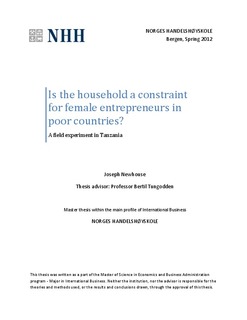| dc.description.abstract | This master’s thesis analyzes whether the household is a constraint on married female entrepreneurs, relative to male entrepreneurs. The research is based on an experiment conducted in Tanzania by NHH using PRIDE microfinance clients, and the data comes from the corresponding surveys attached to said experiment. My hypothesis is that the household is a larger constraint to the businesses of married females than it is for the businesses of married male entrepreneurs, and that this constraint is what prevented their businesses from experiencing the positive benefits associated with the business training from the experiment. Using economic theory from household decision-making models, I show how theoretically, women could be disempowered in the decision-making process and even potentially penalized if or when their business does well. The quantitative and qualitative data from the surveys reinforce this theory, as the household constraint is illustrated from the questions and data using the proxy indicators of a time constraint and a decision-making constraint. They show that the household is a greater constraint for women than it is for men, and that the training does not relax this constraint, meaning that the household is a significant and possibly primary constraint on the businesses of married female entrepreneurs. This is crucial in explaining the lack of positive effects from the training on the businesses of married women. | no_NO |
